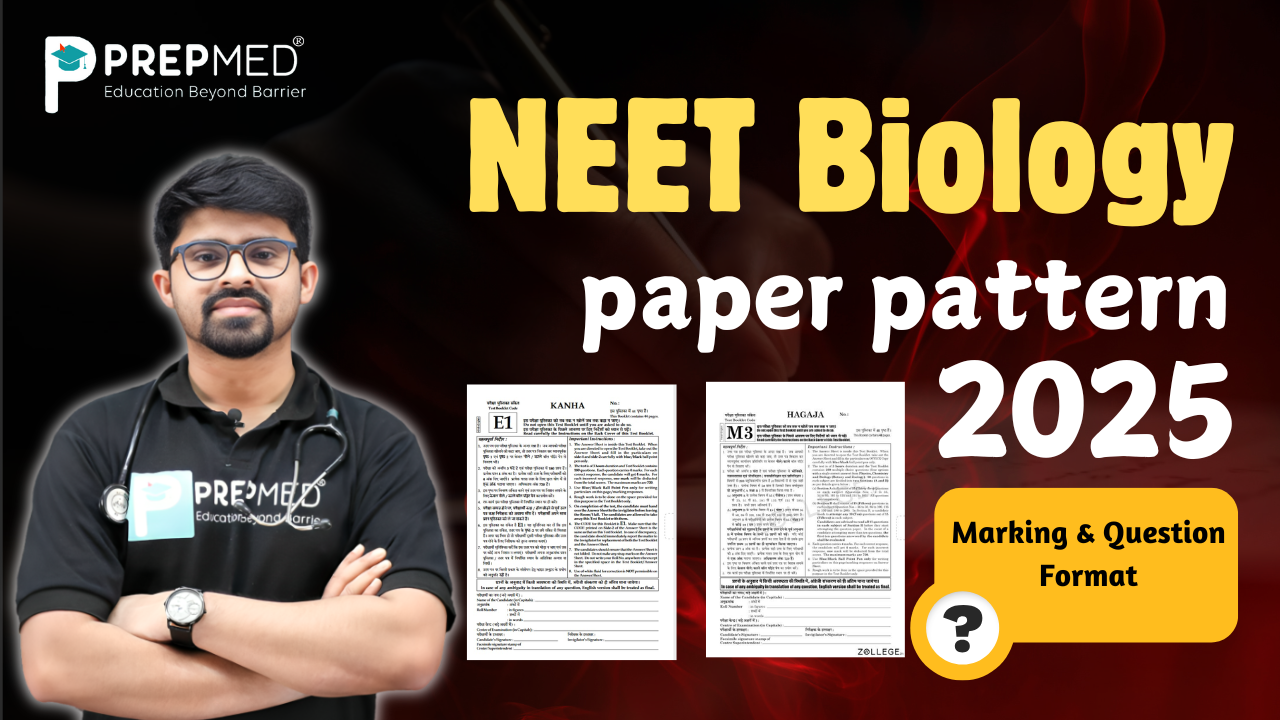February 02, 2025
NEET Biology Paper Pattern: Marking & Question Format
The NEET 2025 Biology examination has 90 multiple-choice questions that split equally into Botany and Zoology sections with 45 questions each. Students must complete the pen-and-paper examination within 180 minutes. Marking +4 points for every right answer but deducting -1 point for every wrong response. No marks are deducted for unanswered questions.
Biology contributes 360 of the 720 total marks that make up the NEET exam. The examinations aim to evaluate knowledge from the NCERT syllabus covering both Classes 11 and 12. Candidates have the option to choose their language preference during their application process since the examination offers 13 different language options aimed at promoting inclusivity.
Candidates can boost their success rate by answering 85 to 90 percent of the questions correctly while being cautious to avoid negative marks through mistakes. The exam consists of multiple-choice questions (MCQs) that candidates must finish within the time limit.
Overview of NEET UG 2025 Biology Paper
The NEET UG 2025 Biology examination evaluates students' academic understanding of materials studied in Biology during Class 11 and 12. Here's an overview:
Structure: The exam consists of 90 questions which are split evenly into Botany with 45 questions and Zoology with 45 questions.
Duration: 3 hours (180 minutes).
Mode: Pen-and-paper mode.
The entire Biology section includes 360 marks which form part of the 720 mark total score in NEET UG 2025 examinations.
Marking Scheme:
Correct Answer: +4 marks.
Incorrect Answer: -1 mark.
Unattempted Questions: No marks deducted.
The examination consists of Multiple Choice Questions (MCQs) which consists of four answer options where students must identify the single correct response.
The NEET exam is conducted for students in thirteen languages where applicants can choose from English, Hindi, Assamese, Bengali, Gujarati, Kannada, Malayalam, Marathi, Odia, Punjabi, Tamil, Telugu and Urdu.
Key Points:
- Students should focus on studying their NCERT textbooks together with solving past year papers.
- Attempt 85-90% of the questions correctly because this strategy will bring you the highest score.
- You should wisely distribute your time to complete all questions during the specified time period.
Marking Scheme and Negative Marking
The NEET 2025 Biology section contains a total number of 90 questions.
Marking Scheme:
There are 90 questions distributed over Botany and Zoology subjects in the Biology section of the examination.
45 questions from Botany
45 questions from Zoology
Type of Questions:
Every question on the NEET Biology paper pattern 2025 requires you to choose one option from multiple choices.
MCQs contain four options from which you must select the correct response.
Marks per Correct Answer: +4 marks for each correct answer.
Marks per Incorrect Answer: -1 mark for each incorrect answer (Negative Marking).
Unanswered Question: Answers to unattended or review-marked questions receive no points. Questions that remain unanswered receive zero points because no deduction occurs for unattended choices.
Summary of Marking Scheme:
Correct answer: +4 marks
Incorrect answer: -1 mark
Unanswered: 0 marks (no deduction of marks)
Example:
Answering 45 Biology questions accurately will bring you a total of:
45 × 4 = 180 marks.
Your total marks decrease by 5 when you incorrectly answer 5 questions.
5 × 1 = 5 marks.
Important Tips for NEET 2025 Biology Preparation:
- Students preparing for NEET examinations must focus on NCERT course material since most questions stem from the NCERT Biology textbooks.
- Prioritize solving previous year exam questions to grasp the patterns NEET uses for examination questions.
- Some topics receive increased weightage in NEET Exams because of their importance: Human Physiology, Genetics, Ecology and Reproduction.
- You need to grasp fundamental concepts instead of memorization. Focus on conceptual clarity.
Difficulty Level Analysis (Past Trends & Predictions)
The past trends in NEET Biology difficulty levels follow a distinct pattern.
General Pattern:
The NEET's Biology section normally presents moderate difficulty when compared to both the Physics and Chemistry sections.
Students can expect to encounter the majority of Biology questions directly in NCERT textbooks with a stronger emphasis on chapters from NCERT Class 11 and 12.
The NEET exam focuses on conceptual understanding which makes memorization an insufficient strategy for success.
Question Distribution:
Biology questions at NEET comprise 70 to 80 percent easy-to-moderate content which students can answer directly if they understand the concepts properly.
Only 20 to 30 percent of the questions fall into the harder level category. Questions from Genetics and Biotechnology along with Reproduction demand a deep understanding of fundamental principles and concepts.
Focus on NCERT :
The majority of questions in Biology exams come from NCERT Biology textbooks.
Diagrams: Many questions in Biology are based on labeling diagrams, identifying parts of cells, plant structures, or human anatomy, so practicing diagrams is essential.
Repeat Trends:
The weightage for Human Physiology and Plant Physiology stands as one of the highest among all topics. Similarly, chapters from Reproduction, Genetics, and Ecology often have a moderate to high difficulty level but are very important.
Time Management Strategy for Biology Section
You need to effectively manage your time spent on the Biology part of NEET 2025 to achieve the best possible score. The Biology subject in NEET falls into the less difficult category as compared to Physics and Chemistry because most questions are asked from NCERT textbook so you need to choose the correct answers accurately within a fraction of seconds.
1. Understand the Total Time Allocation
The NEET exam has a total duration of 3 hours (180 minutes) for 180 questions.
Biology has 90 questions, which is half the exam.
So, the time for Biology should ideally be 45 minutes. This means you should aim to spend about 30 seconds to 1 minute per question on average, though some questions may require more time, while others will be quicker to answer.
2. Prioritize Easy Questions (First 25-30 Minutes)
Start with the questions you find easiest, usually those that require basic recall or straightforward NCERT facts.
The first 25-30 minutes should be used to tackle these questions and gather as many easy marks as possible.
Study the entire Biology section to identify all easy questions.
When you encounter simple questions, answer them quickly within 30 to 45 seconds and proceed to the next question.
3. Spending 15 to 20 minutes on questions of moderate difficulty (Move to Moderate Difficulty Questions)
Identify the moderate-difficulty questions after you complete marking the easier ones.
Don't spend more than one minute on questions that require conceptual understanding and complex information retrieval.
Avoid spending too much time on any specific question. Mark difficult questions for review before moving ahead to the next ones.
4. Leave Difficulty level questions to answer at last (Final 5-10 Minutes)
You will also find 10-15 questions from difficult topics in the exam paper. Do not allocate extended amounts of time to these questions which seem hard or you are uncertain. The last 5-10 minutes allow you to revisit unanswered questions but avoid guessing to prevent receiving negative marks.
Spend only 1-1.5 minutes of your time on complex questions once you finish answering easy and moderate-level questions. It is wiser to leave questions unanswered than selecting wrong options when you are unsure about the correct response.
5. Final Review and Adjustments
Use the last 5 minutes to revisit your selected review questions.
Verify the diagrams and all marked answers in the last minutes.
Utilize the leftover time to verify your answers for mistakes.
6. Sample Time Breakdown:
Allocate the first 25 minutes to answer 40-45 easy questions that should take 30-45 seconds each.
During the next 15 to 20 minutes of the exam period spend one minute on each of the 20 to 25 moderate difficulty questions.
The final 10-15 minutes should include a review session followed by attempts to solve the 15- 20 challenging questions or those previously marked for review.






